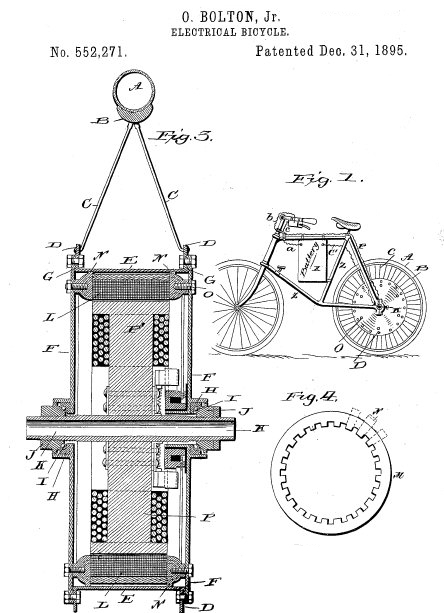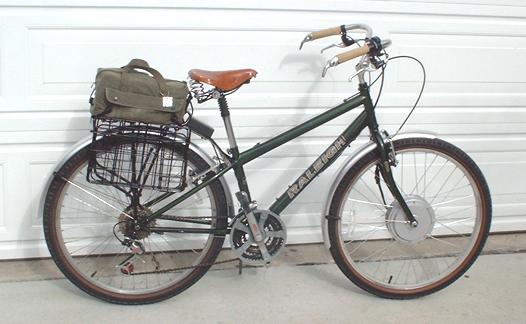Our Mesa E-Bike Shop is Now Open!
You Don't Have to Buy One, Just Try One!
Test Rides Are Always Free!
Swing on by and see what all the buzz is about! The E-Bike is the most exciting evolution of the bicycle since the mountain bike! Seriously you need to check these out!
Mesa - E-Bike Shop: Location & Hours | 602-675-1774
Gilbert - E-Bike Shop: Location & Hours | 480-892-1315
Shop E-Bikes  The Top Brands and Best Pricing all With Service for Life!
The Top Brands and Best Pricing all With Service for Life!
We installed our first E-bike kit over 15 years ago and as an early adopter to the segment we have become an E-bike authority and category advocate. Our very own Owner, Brandee Lepak has been, and is, a HUGE advocate for electric bikes. Most recently she helped pass Arizona's E-bike Bill which classifies the different types of e-bikes and cements their legitimacy as a form of transportation on Arizona roads giving them the same rights of the road as a traditional bicycle. When it comes time to shop for an electric bike please support those that support you, and with Global Bikes we've got your back....
E-Bikes Starting at $1299
12 Months deferred interest Financing (oac)
If you pay the amount financed in full by the end of the promotion period you will pay no interest on the purchase price,
monthly payments are required, click on through for details or stop by one of our locations!
Financing Offer (oac) See Shop For Details - No credit needed 90-Day Offer Also Available
Arizona's Largest Southeast Valley Electric Bike Dealer

Trek Electric Bikes
Trek combines speed and style through an innovative pedal-assist motor, advanced electronics, and a sleek design, Trek e-bikes represents the full capabilities of the electric revolution. They're capable of achieving top speeds of 45 Km/h while you pedal, so they'll deliver near superhuman power to any rider.
Gazelle Electric Bikes
Experience the joy of riding an ebike with Gazelle Bikes. Climb a daunting hill with ease, arrive fresh and relaxed at work with a carefree and car-free commute, or simply ride through the countryside to see where the road takes you. It's all possible with the power, convenience, and reliability of Gazelle ebikes. Our pedal-assist ebikes come in a range of styles, seating positions, and performance levels. We have the perfect ebikes to meet the preferences and needs of every rider.

Raleigh Electric Bikes
The world’s most efficient invention just got an upgrade. The future is now & our eBikes are here to give you a boost in the right direction. Seamlessly integrated pedal assist technology offers a helping hand when you need it and won’t when you don’t. Display, controls, battery & safety mechanisms have all been integrated & optimized.
Aventon Electric Bikes
Aventon electric bicycles change the game. They bring comfort into the fold while ensuring substantial electric motor power that gives the rider a range far greater than many other brands. On average, Aventon's electric bikes have a battery range of 45 miles. That kind of range coupled with fat tires, upright positioning and comfortable saddles make Aventon ebikes approachable for so many!
Electra Electric Bikes
Life Electrified! Those who own an electric bike ride three times more often and three times further. We like to think those who own Electra Go! e-bikes have three times more fun, too. If you’re ready to start your e-life, or perhaps upgrade your current ride, we have a wide range of e-bikes for just about everyone. Ready? Let’s Go!

Pivot Electric Bikes
Pivot bikes are designed for performance, sharing the same cutting edge technology, geometry, and suspension as our entire line of engineering-forward bikes. In order to improve the performance of bicycle technology, Pivot founders and engineers continually seek the realization of new concepts. Exclusive research and development conducted on a daily basis produces the data, drawings, specifications, testing experiences, and know-how feeds Pivot’s deep well of intellectual property. No bicycle detail is too small.
History of Electric Bikes
 Electric bikes are a new concept, right? Wrong! The very first electric bikes were around in the 1890s. Yes you did read correctly, 1890s not 1990s! Throughout that decade there are records of various patents for bicycles with electric power. As crude as they were, these were the very first electric bikes! In 1897 an electric bike was invented that housed a double electric motor in the crankshaft (not too dissimilar to the crank drive power systems in use today!). In 1898 there was an electric bike with a belt-drive to the rear wheel, and in 1899 there was a roller-drive to the rear! It seemed as though electric bikes were the way forward, so what happened?
Electric bikes are a new concept, right? Wrong! The very first electric bikes were around in the 1890s. Yes you did read correctly, 1890s not 1990s! Throughout that decade there are records of various patents for bicycles with electric power. As crude as they were, these were the very first electric bikes! In 1897 an electric bike was invented that housed a double electric motor in the crankshaft (not too dissimilar to the crank drive power systems in use today!). In 1898 there was an electric bike with a belt-drive to the rear wheel, and in 1899 there was a roller-drive to the rear! It seemed as though electric bikes were the way forward, so what happened?
Well in short, some bright spark invented the internal combustion engine. The said ‘bright spark’ was Francois Isaac de Rivaz of Switzerland, and the year was 1807. Unfortunately for Issac, his attempt was an epic failure. This is the reason that many today still regard Daimler or Benz as being the ‘true’ inventor of the combustion engine, many years later in 1885. Roughly the same time as our initial electric bike boom! The problem was that gas-powered engines were being developed quicker, made commercially available, and ultimately had a much bigger range. The early electric bikes were struggling on paltry 10v batteries and didn’t go far at all. The First motorized vehicle, from Daimler, could manage a whopping 10mph top speed and had half a horsepower! For the following 100 years or so the gas-powered engine was the preferred way to power all vehicles.
Fast forward 100 years to the 1990’s, and all of a sudden people are starting to look at alternatives to fossil fuels. Global warming is a recognised term, and there have been huge developments in electronics. Unlike the crude first attempts, we can now use and develop power controllers, torque sensors and bigger capacity batteries. Japan was the first country to start developing advanced systems, first of all the ‘Zike’, which was in the early 90’s, then quickly followed by Yamaha, Honda and Panasonic all making crank-driven motor units. These were not cheap, but the bikes built in the 90’s proved what can be achieved. Electric bikes had been commercially born!
The rest of the world soon caught on, and China started mass producing hub-based electric motors in large numbers. Electric bikes grew from being just one brand available commercially at the start of the decade, to around 50 brands available towards the end of the 90s.
A few more variations were tried, including a belt-drive system mounted on a pannier rack, a dynamo-style direct drive to the tyre and motors bolted to pannier racks. The main two accepted types were identified as the hub drive (motor situated within the wheel hub) and the crank drive systems. By the turn of the century, there were plenty of electric bikes on the market that could achieve 20 mile ranges, and climb steep hills.
The potential of electric bikes was quickly realized at this point. Brushless motors replaced the older brushed types, allowing more efficient, quieter operation. Lithium battery power was commonplace, enabling much lighter bikes with improved range. Torque sensors started to replace throttles, which made the ride more comfortable and much more natural feeling. Electric bikes have now evolved into the bikes you see today. Lightweight, good-looking and able to complete distances of up to 50 miles on a single charge. Electric bikes are now the fastest growing sector of the cycle industry, and with growing numbers on the road today, and the recent national press recognition it is only set to get even bigger!
The Benefits of Electric Bicycle
Faster Travel
In theory a car can average a high speed, but in practise speed often falls below 10mph in cities. The problem is congestion – motorcycles get around this to some extent, but they’re still confined to the road network. An electric bike can maintain a higher average speed than a bicycle, yet take advantage of the full network of cycle facilities, giving access to routes that cars and motorcycles cannot reach.
No Sweat!
Sweat may not be a serious issue when you’re out for a leisure ride, but it’s more important if you’re cycling to work, and arriving at work sticky puts a lot of people off cycling. Although some employers are rather grudgingly providing showers and other facilities for cyclists, the vast majority have no intention of doing so. An electric bike eliminates the problem at source.
Safety
It sounds unlikely, doesn’t it? But the mathematics is compelling. Think of a steep and busy road, with cars climbing at 30mph. If you previously slogged up the hill at 6mph, but can tackle the same gradient at 12mph with an electric bike, you will see 33% fewer cars, and they will pass you at 18mph rather than 24mph. Or at least, we think that’s correct.
Hill Climbing
That may sound obvious, but it’s the primary advantage. A good electric bike effectively flattens hills, increasing your average speed and eliminating the ‘groan’ factor when a gradient comes into view. Provided you supply a reasonable amount of effort, you can expect to climb hills of 1:10 (10%) on an electric bike with ease, and clear a maximum gradient of 1:7 (14%), or even 1:4 (25%) with the right bike. In hilly country, the effect is nothing short of miraculous.
Electric Bike Running Costs
Purchase cost is a little more than a conventional bike, mechanical wear and tear is about the same, and electricity is so cheap as to be largely irrelevant, but there is an extra expense in terms of battery depreciation. Consequently, an electric bike costs more to run – typically 8 – 12 pence per mile against 3 – 7 pence per mile for a non-assisted bike.
Personal Fitness
Surely a conventional bike will keep you fitter? The figures confirm our experience that an electric bike typically gets used at least twice as often as a conventional machine. Because riding an electric bike is a great deal more enjoyable in hilly country, into strong winds, or when carrying heavy loads, users tend to make better use of them.
Sustainable
This is a bit weird, but the evidence is very compelling. Ride a normal bicycle and you will have to top up with extra calories at Tescos. Producing and transporting that food takes a lot of energy, and it’s typically more than the electric bike battery needs to do the same amount of work.





